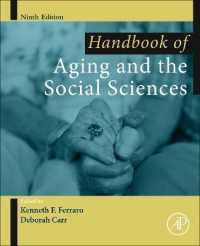Full Description
What roles do different kinds of knowledge play in medicine? What roles should they play? What standards (epistemic, ethical, practical) should be met before knowledge is used to develop policy or practice? Medical decision-making, whether in the clinic or at the policy level, can have serious and far-reaching consequences. It is therefore important to base decisions on the best available knowledge. Yet deciding what should count as the best available knowledge is not easy. This important book addresses philosophical questions about what kinds of knowledge should be taken into account, and how knowledge should inform practice and policy.
The chapters in this volume examine the relationship between knowledge and action in medical research, practice, and policy. "Knowledge" is broadly construed to include knowledge from clinical, laboratory, or social science research, and from the clinical encounter, as well as broader background assumptions prevalent in society that inform both the kinds of knowledge that are taken to be relevant to medicine and how that knowledge is interpreted in decision-making. Such knowledge may be relevant not only to clinical decision-making with regard to the care of individual patients, but also to the practice of scientific research, the development of policy and practice guidelines, and decisions made by patients or by patient advocacy groups.
Contents
Introduction / Robyn Bluhm / 1. Case-Based (Casuistic) Decision-Making Mark Tonelli / 2. Evidence-Based Medicine versus Expertise: knowledge, skills and epistemic actions Sophie van Baalen and Mieke Boon / 3. Phenomenology, Typification, and Ideal Types in Psychiatric Diagnosis and Classification Anthony Vincent Fernandez / 4. The Reproducibility of Epistemic Humility Abraham P. Schwab / 5. Reframing a Model - The Benefits and Challenges of Service User Involvement in Mental Health Research: Tania Gergel and Thomas Kabir / 6: The Role of Patient Perspectives in Clinical Case Reporting Rachel A. Ankeny / 7. "The Science is Clear!" Media Uptake of Health Research into Vaccine Hesitancy Maya J. Goldenberg and Christopher McCron / 8: Values as 'Evidence For': Mental Illness, Medicine, and Policy Susan C. C. Hawthorne / 9. RCTs and EBM as Gold Standards: A Trojan Horse for Biomedicine? Keekok Lee / 10. The Legitimacy of preventive medical advice. Is knowing enough? Delphine Olivier / 11. Translational research and








